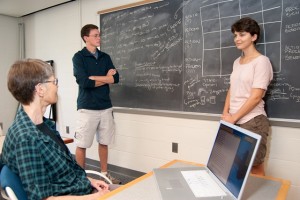
Professor Carolynn Van Dyke, Jared Katz '12, and Katherine Metcalf '12
Anyone who has ever studied a foreign language or traveled to a country with limited knowledge of its language knows the value of electronic translation methods. Every language has nuances that aren’t always clear to a translating program, so Jared Katz ’12 (Stoneham, Mass.) and Katherine Metcalf ’12 (Springfield, Va.) are attempting to improve natural language processing (NLP) programs by looking for universal aspects of metaphor that can be coded to create more advanced programming.
As Metcalf explains, programs rely on lists of known and established metaphors. In order to enable programs to decipher both literal and figurative language, they’re studying the ancient Mayan, Egyptian, and Sumerian languages to discover patterns people use to create and comprehend metaphor.
“Metaphor is present in all parts of human language, as it’s used anytime something abstract is being talked about,” explains Metcalf, who designed her own major in linguistics. “For example, when people talk in reference to time, they are speaking metaphorically. So, it’s important to understand metaphor if one wants to understand half of human language. One of the most common uses for NLP programs is for language translation. The more efficient translation devices become, the easier it will be for people to communicate and collaborate on a cross-cultural, cross-national scale.”
Katz and Metcalf’s project is part of the Grand Challenges Scholars Program. Carolynn Van Dyke, March Professor of English, is their faculty mentor. In 2008, the National Academy of Engineering identified 14 Grand Challenges for Engineering in the 21st century. Three other Lafayette groups were selected to receive support through the program, including Emily Melvin ’12 (Seaford, N.Y.); Yue “Luna” Yuan ’12 (Wuhan, China) and Felix Hutchison ’12 (Plainsboro, N.J.); and Thomas Benjamin ’12 (Norristown, Pa.) and Elliott Mitchell-Colgan ’12 (Henderson, Nev.).
Beginning their projects this summer, they will complete them in their senior year. Through a gift from a Lafayette alum, each student receives $3,000 in summer research stipends in addition to the $3,000 budget for project expenses, on-campus summer housing, and funding to participate in the Grand Challenges Scholars Program National Summit during their senior year. The Grand Challenges approach at Lafayette is unique in that the students must take an interdisciplinary approach to solving their problems, combining engineering with the liberal arts.
“It seems that one of the reasons why NLP has not developed as quickly as it could have otherwise is because the computer scientists coding the current programs tend not to work with humanists and social scientists,” says Katz, who designed his own major in archaeology. “It also seems that humanists and social scientists don’t interact with computer scientists as much as they could. Both these sides are needed if anything significant is going to be accomplished.”
Both students agree that their different perspectives complement each other well. Katz, who worked as a member of Proyecto San Bartolo, an archaeological dig that encompassed the Mayan sites of San Bartolo and Xultan in Guatemala, focuses on the Maya world, so he brings the ancient perspective to the table. Metcalf, on the other hand, focuses more on modern language. The pair decided to study ancient languages because those languages didn’t have much contact with each other, which minimizes cross-cultural contamination, something very prevalent in modern language.
One of the things they’re finding is how similar languages from the ancient and modern worlds actually are. Languages, even those as disparate as ancient Mayan and modern English, demonstrate a common thread across the centuries.
“Ancient languages give us the opportunity to examine language from different points in time,” says Metcalf, who plans to further her education after Lafayette in the study of language and its relation to cognitive processes. “As language is one of the few means by which we are able to express the events that take place within our minds, a study across time can show the evolution of the human experience.”
For Katz, who plans to pursue a graduate degree in archaeology, the Grand Challenges Program has allowed two liberal arts-leaning students to influence computer programming in an exciting way.
“It shows there is a common mindset for all humans. Our research of metaphors within ancient languages has led us to an idea, which will hopefully change the way in which NLP programs look at metaphor,” he says. “If the program we’re starting to develop is successful, then ancient languages have led to a conclusion that will allow computers to better understand language.”

3 Comments
Comments are closed.